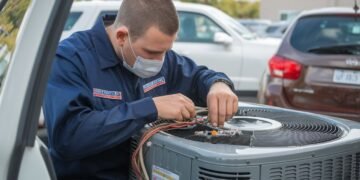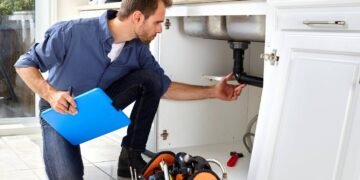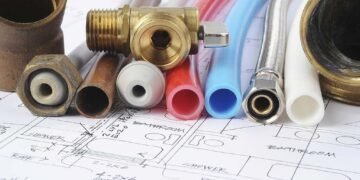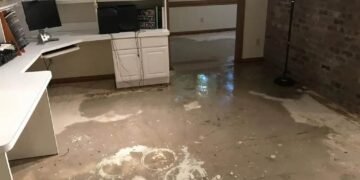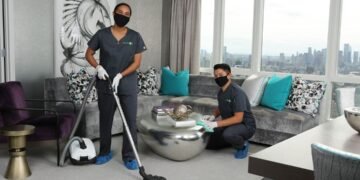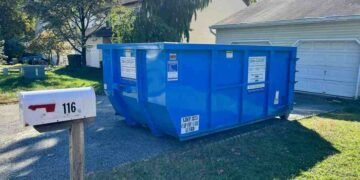Plumbing problems are among the most dreaded issues homeowners can face. A burst pipe or a persistent leak can wreak havoc on your property, causing water damage, mold growth, and significant repair expenses.
However, with a proactive approach and a little know-how, you can prevent plumbing leaks in your residence and enjoy a stress-free living environment. Want to protect your home from plumbing mishaps? Check out these essential steps you can take.
Understanding the Basics
Before we dive into prevention methods, it’s essential to understand why plumbing leaks occur in the first place. Pipes can develop leaks for various reasons, including:
- Age: As pipes get older, they can deteriorate and become more susceptible to leaks.
- Corrosion: Over time, pipes can corrode from the inside, leading to weak spots.
- High Water Pressure: Excessive water pressure can cause stress on your pipes, leading to leaks.
- Freezing Temperatures: Frozen pipes can burst in colder climates and cause significant damage.
- Improper Installation: Poorly installed pipes can develop leaks over time.
- Clogs: Blockages can put pressure on pipes, causing them to spring a leak.
10 Tips to Prevent Plumbing Leaks
Now that we know why leaks happen, let’s explore how you can prevent them:
Tip 1: Regular Inspections
Regular inspections are your first line of defense against plumbing leaks. Here’s what you should do:
- Check for Moisture and Water Damage: Regularly inspect areas around sinks, toilets, and water heaters. Look for any signs of moisture, dampness, or water damage. Water stains on walls or ceilings are a red flag.
- Watch for Discoloured or Peeling Paint: Keep an eye on the condition of your walls and ceilings. If you notice paint that’s discoloured or peeling, it could be an indication of a hidden leak. The moisture from a leak can cause paint to lose its adhesion and peel away.
Tip 2: Fix Leaks Promptly
Addressing leaks promptly is crucial to prevent more significant issues. Here’s why:
- Small Drips Lead to Big Problems: A minor leak can worsen over time, causing structural damage and mold growth. The longer you wait to fix it, the costlier and more extensive the repairs can become.
- Savings on Repairs: Fixing a leaking shower or drain when it’s small is far less expensive than dealing with a major plumbing repair or water damage restoration.
Tip 3: Maintain Your Water Pressure
Proper water pressure is essential for your plumbing system’s health. Here’s what to consider:
- Excessive Pressure Causes Stress: High water pressure can put unnecessary stress on your pipes, joints, and fixtures, increasing the risk of leaks and bursts.
- Invest in a Water Pressure Gauge: Purchase a water pressure gauge from your local hardware store. The recommended pressure range is typically between 45-55 psi. If your pressure exceeds this range, consider installing a pressure regulator to bring it within acceptable limits.
Tip 4: Insulate Pipes
Protecting your pipes from freezing temperatures is vital. Here’s how to do it:
- Frozen Pipes Can Burst: Frozen pipes can burst in cold climates, causing significant damage and flooding.
- Use Insulation Materials: Install pipe insulation sleeves or heat tape on exposed pipes, especially in unheated areas like basements and attics. This insulation will help keep your pipes warm during the winter months.
Tip 5: Keep Drains Clear
Maintaining clear drains is essential for a healthy plumbing system. Here’s what you should know:
- Clogged Drains Increase Pressure: Clogs can obstruct water flow, increasing pressure on your pipes and fixtures.
- Use Drain Screens: Install drain screens in sinks and showers to catch debris like hair and soap scum. Additionally, avoid pouring grease, food particles, and non-flushable items down drains.
Tip 6: Be Mindful of What You Flush
What you flush down the toilet matters. Follow these guidelines:
- Stick to Toilet Paper and Waste: Only flush toilet paper and human waste down the toilet. Baby wipes, sanitary products, cotton balls, and other non-flushable items can clog pipes and lead to leaks.
Tip 7: Avoid Chemical Drain Cleaners
Chemical drain cleaners may seem like a quick fix, but they come with risks:
- Corrosion Over Time: These harsh chemicals can corrode your pipes, weakening them and increasing the chance of leaks.
- Use Alternatives: Opt for a drain snake or a plunger to clear blockages instead of chemical cleaners. They’re effective and won’t harm your plumbing.
Tip 8: Upgrade Old Pipes
Older plumbing materials can be more susceptible to leaks. Consider this:
- Modern Materials Are More Resistant: PVC and PEX pipes are modern materials that are highly resistant to corrosion and leaks. If your home has outdated plumbing, consider upgrading to these materials.
Tip 9: Install a Water Softener
Hard water can be a source of plumbing issues. Here’s how to address it:
- Mineral Buildup in Pipes: Hard water contains minerals that can accumulate in your pipes, leading to clogs and reduced water flow.
- Water Softener Solution: Install a water softener to treat hard water and prevent mineral buildup in your plumbing system.
Tip 10: Call in the Experts
While you can perform many preventive measures on your own, don’t overlook the importance of professional inspections:
- Hidden Issues: Professionals like plumbers in Adelaide can identify hidden issues you might miss during DIY inspections.
- Regular Maintenance: Regularly scheduling a plumber’s visit can ensure that your plumbing system is in top shape, helping to prevent leaks and costly repairs in the long run.
Final Words
By following these ten tips, you’ll be well-equipped to prevent plumbing leaks in your home, saving you both time and money in the long term. Remember, a proactive approach to plumbing maintenance is your best defence against unexpected and costly leaks.
Recommended Posts:


